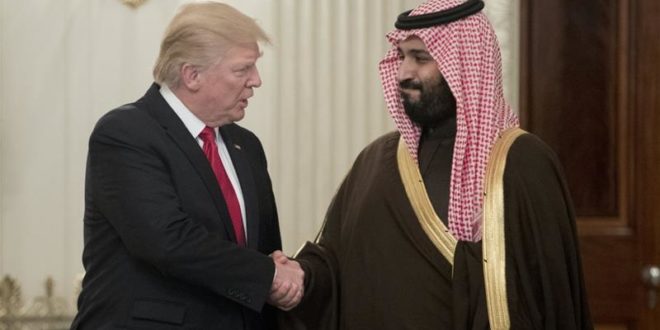Will Trump dismantle Obama’s agenda in the Middle East?
By Shehab Al Makahleh •
The US president Donald Trump is scheduled to travel to Saudi Arabia’s capital Riyadh this Friday in his first foreign trip which also includes visits to Israel, the Vatican and the NATO summit in Brussels few days later. Will this trip pave the way for a new Middle East war? Will it be setting stage for shaping the new Middle East map?
The trip, as reported by the White House, “will begin with a truly historic gathering in Saudi Arabia with leaders from all across the Muslim world,” where “we will begin to construct a new foundation of cooperation and support with our Muslim allies to combat extremism, terrorism and violence.”
Yet, as with all things Trump, controversy and speculations about the ultimate purpose and expected outcomes of the president’s Middle East trip border on conspiracy theories.
At home, only a day ahead of the trip, a special counsel has been appointed by the Justice Department to “oversee a federal investigation into Russian interference in the 2016 election, including potential collusion between the president’s campaign associations and Russian officials.”
The same day, the US-led anti-ISIS coalition is reported to have bombed Syrian Army troops, allegedly in the de-escalation zone, while the Turkish Foreign Minister Mevlut Cavusoglu, in an interview has claimed that the US-envoy to the anti-ISIS coalition, “McGurk openly supports the (Kurdish) PKK (underground) and (Syrian Kurdish) YPG (militia)” so “it would be beneficial” to oust him. In line with the official Turkish stance, Cavusogulu stated that both the PKK and the YPG are terrorist organizations. The problem is that the YPG is the US main ally in Northern Syria, especially in the liberation operation of the ISIS de facto capital Raqqa.
The rift over Kurds and the Cavusoglu’s comments come just few days after Trump hosted his Turkish counterpart in Washington, a meeting during which Erdogan stated that Turkey will apply rules of engagement with the YPG “without asking anyone”, if the Kurdish militias attack its military forces.
The growing rift between Turkey and the US comes at a very inauspicious time for the US but possibly quite beneficial for its antagonists in the Middle East and the global competitors ― China and Russia.
Erdogan’s visit to Washington was further overshadowed in the American media by the exclusive news about Trump’s alleged leak of intelligence on ISIS attack plans to the Russian Foreign Minister Sergei Lavrov, during the meeting of the two just days before Erdogan’s visit. Known for his love of media attention and being in the limelight, Erdogan could not have liked such a poor treatment, which only added insult to the injury as he arrived to Washington following Trump’s approval of arms supplies to Kurdish YPG militias in Syria.
As a traditional US ally in the Middle East Turkey is increasingly finding itself at odds with the US and protecting its own national interests, and is actively reconsidering its foreign policy, economic and military alliances. Erdogan’s statements during a Beijing-hosted Belt and Road Forum few days before his Washington visit reflect this paradigm shift in his thinking. Moreover, Erdogan has certainly not forgiven the US for not extraditing the controversial exiled cleric and his main critic and foe, Fettullah Gulen, whom Erdogan personally blames for last year’s failed coup that sought to oust him.
Trump’s “Russian intelligence leak” media bomb first appeared in the Washington Post which accused the President of endangering the allied country’s agent safety by sharing the intelligence with the Russians. The country in question was reported by the Israeli media as Israel, while some Arab media and analysts have disputed the speculations saying that Israel does not have human assets among ISIS ranks, and that the allied country in question is Jordan.
Israeli media also speculated that the leak was timed to spoil the chances of reaching the deal between Arabs and the Israelis, as Trump’s trip to the Middle East is believed to be part of his promise to reach the ultimate “peace deal” between Palestine and Israel ― a conflict used by many extremist factions in the Middle East and beyond as an excuse for spreading hate and terrorist narratives among disenfranchised Muslims.
Most importantly, the Israeli media decried the leak as aimed at ruining forging of an historic alliance with the Sunni Arab states, led by Saudi Arabia, against Iran’s growing influence in the region. Official statements on US president’s visit to the Middle East indeed mention countering Iran as one of the trip’s main goals, and the plan to achieve this goal is by establishing the Arab NATO-style organization.
Iran is accused by both the US and Saudi Arabia as the key sponsor of terrorism and extremism.
Significantly, on the day of Trump’s arrival to Riyadh, Iran is holding presidential elections, essentially featuring two main candidates, the sitting and moderate president Hassan Rouhani and the conservative Seyed Ebrahim Raisi ― with the latter having greater chances of success. Oddly enough, only three weeks ago Iranian leadership has on several occasions announced its willingness for greater regional cooperation with focus on inclusive social and economic development ― in stark contrast with the Saudi’s war drums’ beats.
Trump–Sunni Arab meetings in Saudi Arabia aim to send a clear message to Iran that no matter which candidate wins the presidency, the US-Sunni Arab planned alliance is there to counter its perceived expansionist policies and desire for regional dominance. This message was voiced last week by the Saudi deputy crown prince Mohamed bin Salman, who said that Saudis cannot wait for Iran to bring war to their doorstep, but would rather make sure they take the war to Tehran.
The US presidential Riyadh visit will start with the Trump’s meeting with Saudi royals, followed by the Muslim and GCC leaders meeting on 23 May where different issues will be discussed, including the biggest ― truly historic ― American weapons deal ever ― said to be worth $300 billion over the next 10 years, in addition to other projects, including a $40 billion worth of Saudi investment in the US.
Leaders in Saudi Arabia believe that Trump will sign the biggest arms deals in history between both countries, as a prelude to announcing the “Arab NATO” plan to buoy the US-led pact endorsing the alliance to act to ensure regional security.
It is believed that the most predictable address of Trump’s frenzied six months in office is to mark a U-turn and a reset in relations with Sunni Arab countries, which were ill at ease by the US president’s statements on Islam throughout his electoral campaign. After his electoral victory, Sunni Arabs found a kind of reassurance in his anti-Iran stance as he promised to look into the Obama brokered nuclear deal and consider imposing new sanctions on Tehran.
The coming Trump-Sunni Arabs summit main heading could as well be “Iran, the Grand Prix”. On other hand, Saudi deputy crown prince and defense minister, Mohammed bin Salman, will also magnify his extensive and broad national reform program by discussing some of the plans with the American president.
Noteworthy, during his electoral campaign Trump promised to make the Arab Gulf states pay for the American protection of their national security. The expected weapons sales deal announcement sounds like Trump’s making good on his campaign by closing deals beneficial for the American interests. But in reality, the expected deal is nothing new as the massive weapons sales are a constant in US-Saudi relations for decades.
Despite Trump’s promises to be the ultimate peace maker in the Middle East, the speculated big weapons sales deal to Saudi Arabia is everything but a move in the direction of peace. What this deal would deliver to the Middle East is more of the same ― perpetual war.
The announcement of the formation of the Arab NATO-like organization ― with the purported aim of fighting terrorism is more likely just a cloaked anti-Iran army. But what would that mean for the region and the global politics, considering that Iran is not alone despite the wishful thinking of its archenemies: Israel and Saudi Arabia? What would happen if Saudi-led Arab NATO decided to engage in another war, similar to the one currently fought in Yemen?
Arab NATO ― if formed as announced ― would have to face off against Iran’s considerably powerful armed forces supported by the Shanghai Cooperation Organization (SCO) allied army whose combined size and military might would likely lead to an extremely negative outcome for Saudi Arabia.
The fact that Saudi Arabia is already engaged in a protracted and unsuccessful conflict against much weaker and poorer Yemen, clearly indicates the kind of cost that a threatened war against Iran ― should it indeed take place ― would have for the Saudi kingdom. The war that Saudi defense minister and deputy crown prince is preparing for would indeed lead to a Saudi state collapse following military defeat at the hands of Iran’s allies.
Ahead of the Trump visit Saudi leadership may be wise to reconsider its priorities, including the bellicose orientation of its de facto ruler, deputy crown prince Mohamed bin Salman. Deputy crown prince may have progressive economic policy reform ideas worth pursuing for the country’s future, but is extremely young and lacks military prowess for a leader of such a rich country. The power thirst and desire for regional dominance may ultimately land the young prince into deep trouble that might cost his kingdom way more that it can afford.
Trump certainly does not have much of foreign policy experience, but he does have plenty of negotiating experience and is unlikely to make concessions unless he sees clear economic benefit for the US.
Trump’s on the road to Saudi Arabia in pursuit of making America great again. Saudis should keep this in mind while negotiating for their own interests with a cool head. Question is ― are their heads cool enough considering the losses in Syria and Yemen. We’ll find out soon enough.
Shehab Al Makahleh is Geostrategic Media co-founder and a senior policy and media adviser in the Middle East.
 Geostrategic Media Political Commentary, Analysis, Security, Defense
Geostrategic Media Political Commentary, Analysis, Security, Defense





